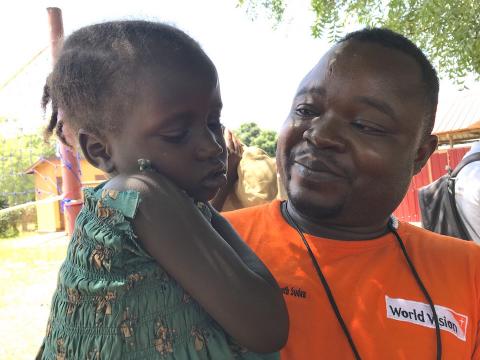Child rights advocate was a child labor survivor: I know how important my work is for the children’s future

By Genge Gabriel, Protection and Gender-Based Violence Officer
My father Michael passed away when I was seven. He was only in his 40s. Three years after, my aunt in Ezo County told my mother to let me stay with them so she could send me to school. The county is part of Western Equatoria State, located 366km from Juba, the capital city of South Sudan.
Instead of studying, I was made to do the housework and baby-sitting. At a young age, I experience mistreatment and child labor from my own relative. There was no way for me to communicate with my family so I endured for one year and half.
One day, a teacher who knew my parents saw me crying while getting some water. He talked to me, found out about my situation and told my mother back in Tambura. As soon as my mother heard the news, she sent my uncle to take me home. I was so happy to be reunited with my mother and nine siblings.
I eventually lost four of my older siblings to South Sudan’s never-ending conflict. Two during the fighting in the 90s and two got sick after that period.
Leading the children's activity in a child-friendly space. Helping children in conflict
Our happiness was short-lived because the conflict in our area worsened and we were forced to flee in Central African Republic. It was where I got my education as a refugee child. Being a devout Christian, my mother convinced me to join the seminary. I agreed because that was also my best option to further my studies.
After meeting all the requirements, I got admitted and was sent to Uganda where I attended ordinary and advanced levels Certificate of Education. I later proceeded to join Nkumba University where I studied Bachelor of Arts Degree in International Relations and Diplomacy.
I eventually got married on 2011 and have three children. During this period, we fled again to a refugee camp in Uganda. This time it was harder because I was a father and had to protect my children unlike in CAR where I depended on my family.
The awareness campaign for child rights and gender-based violence are regularly discussed in Radio Bakhita to reach out to more people in Juba and around the country.
I spent almost a month setting up a makeshift shelter for the family and doing all the work to provide for my family’s needs. At one point my son got sick of a fever and I had to rush him to the hospital managed by health workers from a humanitarian agency. They were quick to respond and saved the life of the little boy.
If not for the aid workers ensuring there were services for health and nutrition services, non-food and food assistance and above all free education, life would have been lost. This has shaped my dream for a career as a humanitarian worker.
Working with World Vision’s protection team, my role enables me to build the awareness and capacity of communities to identify, assess and mitigate protection risks for women, girls and children. I help promote education and awareness on all forms of violence through the eight child friendly spaces and health centers in Juba.
What excites me with my work is the fact that I am not just a responder but have been a survivor. I know exactly how it is as a displaced person and a refugee. With the experience, my compassion grows each day to help women and children get the opportunity to express themselves freely and help them restore a sense of normalcy with their lives disrupted by conflict.
Community partnership is key to an effective protection campaign. Gabriel is with Mary Poni, one of the community leaders who are active in supporting World Vision's activities for children.


